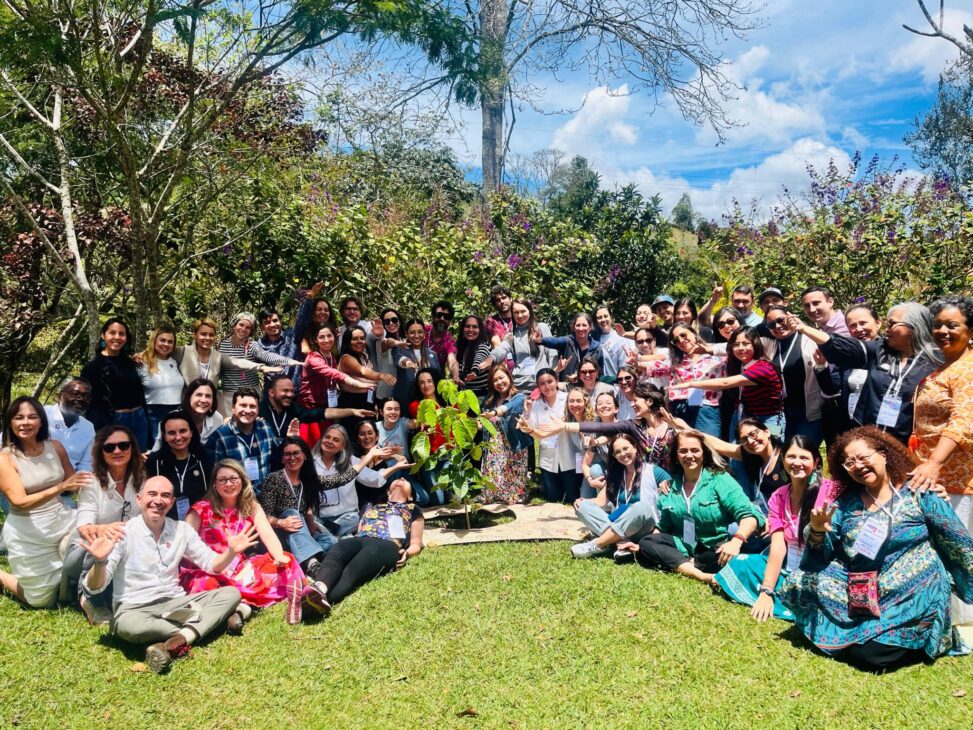Collaboration is key to making an impact in your country with IDGs. A spirit of collaboration is at the heart of a Centre: co-creation, intercultural communication, and trust are the foundation for building a community of social impact.
Country: Colombia
IDG HUB: IDG Colombia Centre
Link to website: https://idgcolombiacentre.com/
Link to presentation:
- When it started:
Four years ago in Colombia, we began bringing together a diverse network of hubs spanning education, government, research, social organizations, and private enterprises. While each organization had its own mission, priorities, and projects, it became clear that a space was needed to connect these efforts, a Centre where diverse sectors could collaborate, exchange resources, and find common ground to address social challenges. With the guidance of the IDG Foundation and the support of its global coordinator, Åsa Jarkson, a committed team emerged. Many were graduates of the IDGs Leadership Course, inspired to integrate the framework into both their organizations and personal lives. This marked the beginning of the Colombia IDGs Centre, to work towards the inner development across the country and to connect with other centers from the Latin American region. - What we have achieved:
The Centre is supported by three anchor organizations:- San José de las Vegas Organization: An educational institution serving 2,600 students (K4–11), 1.200 athletes, more than 2.500 families and 450 staff, embedding IDGs into educational practices.
- EIA University: A top-ranking private university with a strong focus on engineering, economics, and medicine, committed to ethical and humanistic values.
- Greenland Foundation: A foundation from a business group of 27 companies employing 5,800 people in agricultural and commercial sectors, with a strong presence in Urabá and Caldas, two regions in Colombia. Together, they have proven that cross-sector partnerships are not only possible but powerful. In 2023–2024, Colombia participated in the GSLD 1.0 and 2.0 programs (Templeton Foundation-funded). GSLD 2.0 engaged 22 public, private, social, and academic sectors, and 69 people, each developing an IDG-based project to be implemented in 2025. Additionally, seven governmental entities participated in a workshop to integrate IDGs into public policy. We have translated the IDGs and their implementation tools into Spanish so that language is no longer a barrier to access.
We have designed a free, online Spanish course to introduce the IDGs into university curricula, developed by Universidad EIA and San José de Las Vegas, led by the director of the Centre. In 2025, the Centre will launch Latin America’s first IDG Immersion Experience, hosting 60 participants from national and international organizations for four days of deep learning, self, community, and organizational, resulting in one-year implementation programs. Greenland has also developed Guardianes Ecológicos, an environmental culture program that works with rural children in partnership with 83 community councils, fostering environmental stewardship as part of both formal and extracurricular education.
- Impact
The Centre has created a living ecosystem where diverse actors, sometimes with conflicting agendas,discover shared purpose. By facilitating structured collaboration, it bridges polarities between private organizations, rural and urban communities, economic growth and environmental protection, local needs and global goals. This approach has accelerated the adoption of IDGs in educational curricula, inspired environmental action, and positioned the IDGs as a practical framework for policy alignment. The private partnerships emerging from this work have demonstrated tangible results, providing measurable contributions to social and environmental indicators. We have also connected the Global South, bringing people as Mila and Paul Mbikayi to the Immersion and learn from them and cocreate together the next steps for understanding our global connection in nature. - What we have learned
Our biggest lesson: to create systemic change, you must ultimately influence public policy, but the path to get there starts with building trust, demonstrating results, and fostering long-term partnerships. Public-private alliances are essential. Government will play a crucial role, but sustainable change happens when evidence shows that holistic approaches, integrating social, environmental, and economic dimensions, work in practice. The private sector has been pivotal in demonstrating measurable results, while the Centre has become a focal point for training organizational leaders in the IDGs Latam, enabling them to inspire change within their spheres of influence.
In what way does your project relate to the Summit theme ”Bridging Polarities”
The Colombia IDGs Centre embodies the spirit of Bridging Polarities by bringing together a uniquely diverse mix of participants, spanning government, academia, the social sector, private industry, and culture, into a shared space for open and constructive dialogue. This diversity, while our greatest strength, has also been our greatest challenge: learning to co-create from different opinions, political views, and cultural perspectives. By intentionally inviting voices from across the spectrum, we have discovered common ground that transcends backgrounds and beliefs, rooted in the understanding that the world belongs to all of us and must be cared for collectively. Through the IDGs, we create a safe environment where trust, empathy, and shared responsibility flourish, turning tensions into collaboration, differences into strengths, and collective vision into concrete action for a more sustainable, equitable, and thriving society.
Describe something about the real world impact (SDG connection) your project/initiative has contributed to.
We have sparked national conversations about why the SDGs remain unachieved and how inner transformation can drive the change our planet needs. We have created spaces for dialogue with more than 100 companies, government agencies, and social organizations, while also integrating the IDGs into organizational projects. In education, projects such as Medellín Challenge and Emprender con Impacto Digital have mobilized hundreds of students and teachers to co-create sustainable solutions—ranging from smart farms that address food security and school dropout, to entrepreneurship pathways for indigenous Wayuu youth in La Guajira. In government, the IDGs have been connected to the Integrated Planning and Management Model (MIPG), influencing human talent strategies within public entities and opening dialogue spaces in the Swedish Embassy in Colombia. In the business sector, programs like Liderazgo Mentalmente Saludable have trained more than 300 leaders at Incolmotos Yamaha, integrating IDG competencies with mental health, resilience, and responsible organizational cultures. In the social sector, initiatives such as Alianza Soluciones – Caminos que CREO have promoted sustainable socioeconomic inclusion of communities affected by armed conflict, while Timbalé Territorio IDG has become a cultural hub where artists, educators, and youth co-create transformative experiences through art. These efforts are part of a broader Latin American movement: through the IDG Latam Hubs Network, Colombia has contributed to strengthening regional collaboration and visibility, connecting with Costa Rica, Chile, and Argentina. The book IDG Stories of Collective Leadership in Action amplifies Colombian voices and cases of trauma recovery and humanistic leadership, linking inner development with peacebuilding and reconciliation. Together, these actions demonstrate that when inner transformation is prioritized, concrete contributions to the SDGs emerge.


Leave a Reply